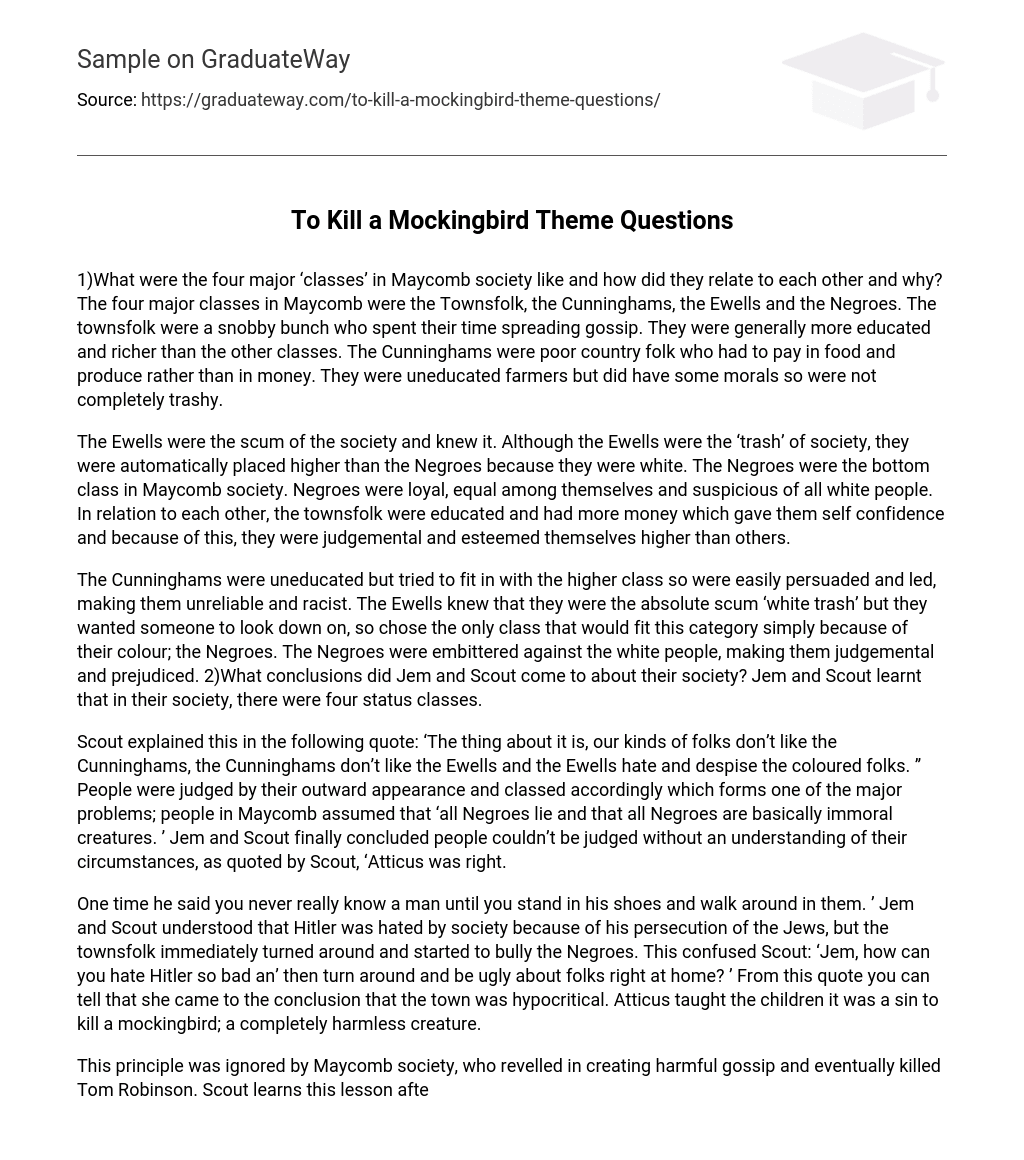1)What were the four major ‘classes’ in Maycomb society like and how did they relate to each other and why? The four major classes in Maycomb were the Townsfolk, the Cunninghams, the Ewells and the Negroes. The townsfolk were a snobby bunch who spent their time spreading gossip. They were generally more educated and richer than the other classes. The Cunninghams were poor country folk who had to pay in food and produce rather than in money. They were uneducated farmers but did have some morals so were not completely trashy.
The Ewells were the scum of the society and knew it. Although the Ewells were the ‘trash’ of society, they were automatically placed higher than the Negroes because they were white. The Negroes were the bottom class in Maycomb society. Negroes were loyal, equal among themselves and suspicious of all white people. In relation to each other, the townsfolk were educated and had more money which gave them self confidence and because of this, they were judgemental and esteemed themselves higher than others.
The Cunninghams were uneducated but tried to fit in with the higher class so were easily persuaded and led, making them unreliable and racist. The Ewells knew that they were the absolute scum ‘white trash’ but they wanted someone to look down on, so chose the only class that would fit this category simply because of their colour; the Negroes. The Negroes were embittered against the white people, making them judgemental and prejudiced. 2)What conclusions did Jem and Scout come to about their society? Jem and Scout learnt that in their society, there were four status classes.
Scout explained this in the following quote: ‘The thing about it is, our kinds of folks don’t like the Cunninghams, the Cunninghams don’t like the Ewells and the Ewells hate and despise the coloured folks. ” People were judged by their outward appearance and classed accordingly which forms one of the major problems; people in Maycomb assumed that ‘all Negroes lie and that all Negroes are basically immoral creatures. ’ Jem and Scout finally concluded people couldn’t be judged without an understanding of their circumstances, as quoted by Scout, ‘Atticus was right.
One time he said you never really know a man until you stand in his shoes and walk around in them. ’ Jem and Scout understood that Hitler was hated by society because of his persecution of the Jews, but the townsfolk immediately turned around and started to bully the Negroes. This confused Scout: ‘Jem, how can you hate Hitler so bad an’ then turn around and be ugly about folks right at home? ’ From this quote you can tell that she came to the conclusion that the town was hypocritical. Atticus taught the children it was a sin to kill a mockingbird; a completely harmless creature.
This principle was ignored by Maycomb society, who revelled in creating harmful gossip and eventually killed Tom Robinson. Scout learns this lesson after she has experienced the town’s prejudice highlighted in the Tom Robinson affair and in the final scene with Boo Radley. Atticus told Jem and Scout, ‘I wanted you to see what real courage is instead of getting the idea that courage is a man with a gun in his hand. ’ Scout and Jem learnt that not all courage is revealed in physical combat; standing up for morals and values when in the minority takes more courage.
By the end of the novel, Jem and Scout had learnt the reason that Boo Radley stayed inside, shown by the quote, ‘I think I’m beginning to understand why Boo Radley’s stayed shut up in the house all this time … it’s because he wants to stay inside. ” The combined effects of Maycomb’s flaws kept Boo Radley inside. 3)What are your opinions about how people in Maycomb treated each other and what do you think the Bible’s comment on racism and prejudice is? In my opinion, discrimination leads to conflict within society and it makes fair decisions almost impossible to execute.
An example of this is the Tom Robinson situation, where he was obviously proven innocent, however because of his status, the jury found him guilty. The townsfolk were also very hypocritical, all hating Hitler for his persecution, but then they all mercilessly persecuted the Negroes without a cause. I think Paul’s right when he says in Galatians 3:28: ‘there is neither Jew nor Greek, there is neither bond nor free, there is neither male nor female: for ye are all one in Christ Jesus. This means that there is absolutely no difference between coloured and white folks; it is the personal attributes which count. Judging was also an issue in Maycomb; the townsfolk did this a lot through spreading poisonous gossip and rumours so that everyone had a misconceived idea about certain people (for example, Boo Radley). I don’t think that we should judge based on the outward appearance and when John says in John 7:24: ‘Judge not according to the appearance, but judge righteous judgment,’ I think that he is absolutely right.





